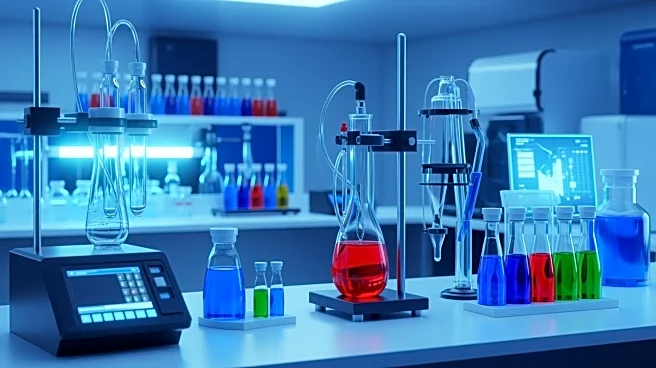What's Happening?
The U.S. biosimilar drug market is facing significant challenges due to complex regulatory pathways and market preferences that favor brand-name drugs over generics. Despite the potential for biosimilars
to create a competitive market and reduce costs, the development of these drugs in the U.S. lags behind Europe. The average cost to bring a biosimilar to market in the U.S. is between $250 to $300 million, which is considerably higher than in Europe. Additionally, the market access pathway in the U.S. is different, often leading to a preference for brand-name drugs. For instance, Humira, a biologic medicine, continues to dominate the market despite the availability of biosimilar competition. This situation discourages developers from investing in biosimilars, as brand-name drugs maintain a significant market share.
Why It's Important?
The slow development of biosimilars in the U.S. has broader implications for healthcare costs and accessibility. Biosimilars have the potential to lower drug prices and increase access to essential medicines, benefiting patients and healthcare systems. However, the current market dynamics and regulatory hurdles prevent these benefits from being realized. As a result, patients may face higher costs and limited options for treatment. The reluctance to develop biosimilars could also impact the pharmaceutical industry's innovation and competitiveness, as fewer companies may be willing to invest in these alternatives. This situation underscores the need for policy changes to streamline regulatory processes and encourage the adoption of biosimilars.
What's Next?
Looking ahead, there is a need for policy reforms to address the barriers to biosimilar development in the U.S. Simplifying the regulatory pathway and creating incentives for biosimilar adoption could help shift market preferences and encourage more companies to invest in these drugs. Stakeholders, including policymakers, healthcare providers, and pharmaceutical companies, may need to collaborate to create a more favorable environment for biosimilars. Additionally, educating healthcare professionals and patients about the benefits of biosimilars could help increase their acceptance and usage, ultimately leading to a more competitive and cost-effective drug market.
Beyond the Headlines
The challenges facing biosimilar development in the U.S. also highlight ethical considerations regarding access to affordable healthcare. The preference for brand-name drugs over biosimilars raises questions about equity and the prioritization of profit over patient welfare. Addressing these issues requires a shift in the healthcare industry's approach to drug development and marketing, focusing on patient needs and cost-effectiveness. Long-term, successful integration of biosimilars into the market could lead to a more sustainable healthcare system, reducing the financial burden on patients and improving overall health outcomes.








